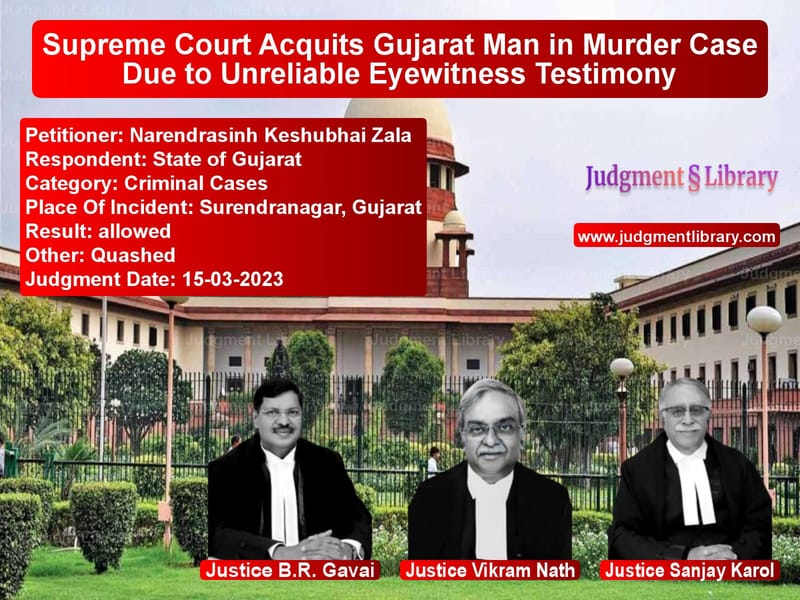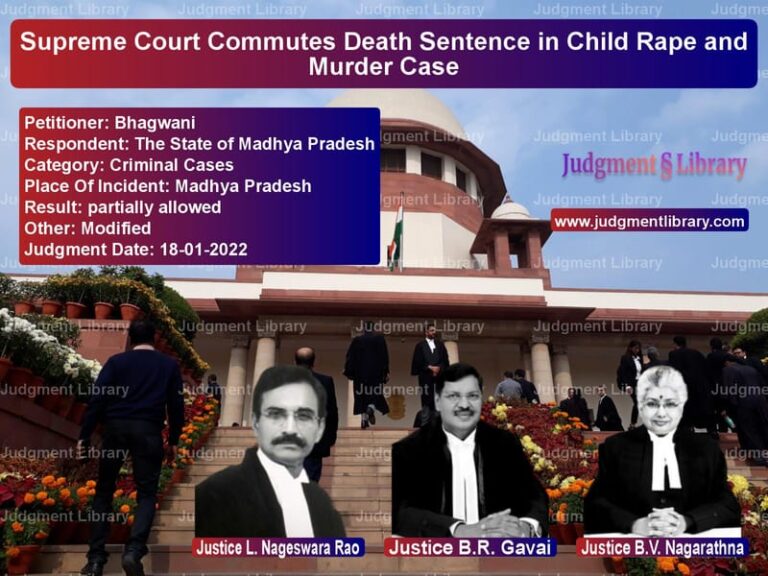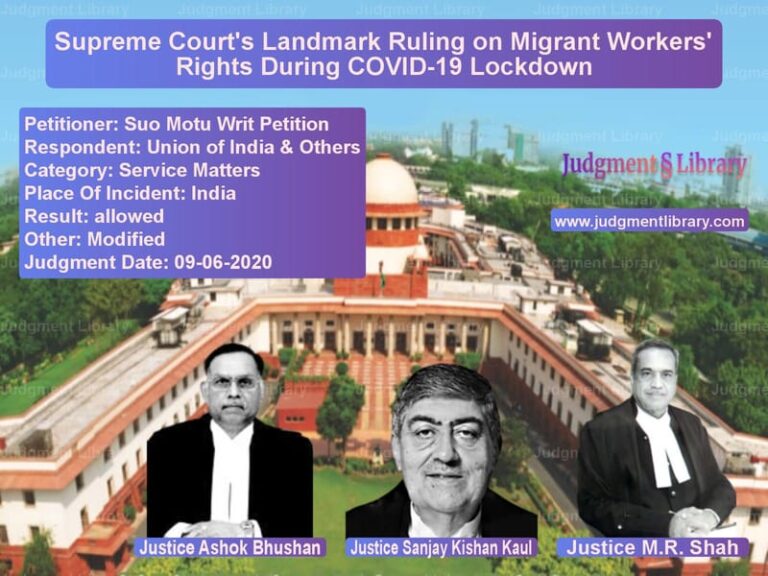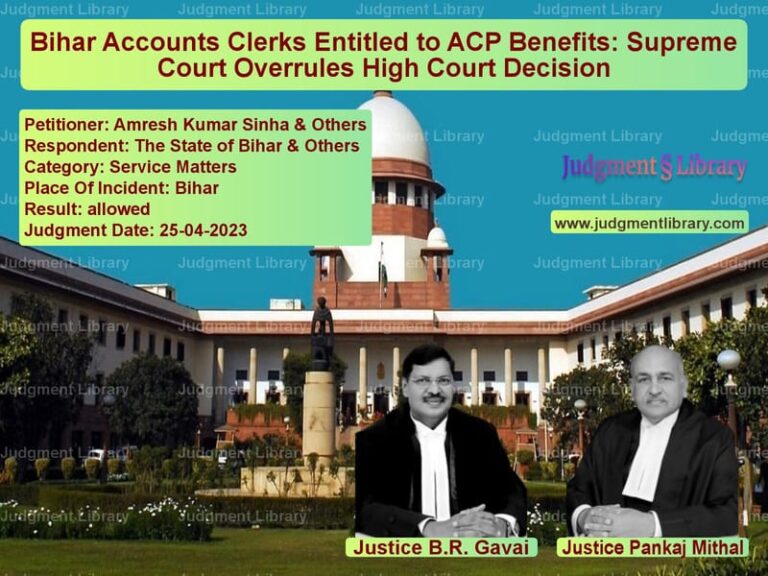Supreme Court Acquits Gujarat Man in Murder Case Due to Unreliable Eyewitness Testimony
The Supreme Court of India has overturned the conviction of Narendrasinh Keshubhai Zala, who was sentenced to life imprisonment for murder under Section 302 of the Indian Penal Code (IPC). The Court found that the prosecution failed to prove its case beyond a reasonable doubt, primarily due to inconsistencies in eyewitness testimony and lack of forensic evidence linking the accused to the crime.
Background of the Case
The case pertains to the murder of Ram, who was allegedly shot dead on January 13, 2002, in Surendranagar, Gujarat. The prosecution alleged that the appellant, Narendrasinh Keshubhai Zala, had a financial dispute with the deceased and murdered him using a firearm.
Based on the testimony of a single eyewitness, PW-3 (Nirav Bipinbhai Patel), the trial court convicted the appellant and sentenced him to life imprisonment. The Gujarat High Court upheld this conviction, following which the appellant challenged the verdict in the Supreme Court.
Prosecution’s Version of Events
- The prosecution claimed that the appellant and the deceased had a financial dispute, which led to the murder.
- On the night of January 13, 2002, the appellant allegedly shot the deceased in the presence of PW-3.
- The police recovered a firearm from the accused, which they claimed was used in the crime.
- The trial court relied primarily on the testimony of PW-3, the only eyewitness, to convict the appellant.
Arguments by the Appellant (Narendrasinh Keshubhai Zala)
- The conviction was based solely on the testimony of a single eyewitness (PW-3), which was inconsistent and unreliable.
- The prosecution failed to establish a clear motive for the alleged crime.
- There was no forensic evidence linking the recovered firearm to the murder.
- The prosecution did not present any independent witnesses or corroborating evidence to support its claim.
- PW-3 did not immediately report the incident to the police, casting doubt on the authenticity of his testimony.
Arguments by the Respondent (State of Gujarat)
- The testimony of PW-3 was sufficient to convict the appellant.
- Although there was no forensic link between the firearm and the murder, the recovery of the weapon from the accused was significant.
- The accused failed to provide a satisfactory explanation for his whereabouts on the night of the murder.
- The High Court had already evaluated the evidence and upheld the conviction.
Supreme Court’s Observations and Ruling
The Supreme Court examined the legal principles governing criminal convictions, particularly those based on eyewitness testimony. It emphasized that:
- A conviction must be based on reliable and credible evidence that proves guilt beyond a reasonable doubt.
- The testimony of a single eyewitness must be consistent, corroborated, and free from doubt.
- PW-3’s behavior was highly suspicious, as he did not report the crime immediately.
- The prosecution failed to establish a direct link between the accused and the crime.
- The forensic evidence was inconclusive and did not support the prosecution’s case.
The Court ruled:
“It is a settled principle of law that conviction cannot be based merely on suspicion or conjectures. When an eyewitness testimony lacks credibility and forensic evidence does not support the prosecution’s case, the benefit of the doubt must go to the accused.”
Read also: https://judgmentlibrary.com/supreme-court-acquits-murder-convict-pradeep-kumar-freed-after-19-years/
Analysis of Eyewitness Testimony
The Court scrutinized the reliability of PW-3’s testimony:
- PW-3 claimed he was present at the crime scene, but he did not report the incident to the police or the deceased’s family until several hours later.
- His statements during cross-examination were inconsistent regarding the time and manner in which he reported the crime.
- There were no independent witnesses to corroborate his claims.
- The police did not recover any bloodstains, bullet casings, or other forensic evidence from the crime scene.
The Court concluded that PW-3’s testimony was unreliable and could not be the sole basis for conviction.
Final Judgment
The Supreme Court set aside the conviction and ruled:
- The prosecution failed to prove guilt beyond a reasonable doubt.
- The conviction and sentence imposed by the trial court and the High Court are quashed.
- The appellant is acquitted of all charges.
- The appellant is to be released immediately unless required in another case.
Legal Precedents Cited
- The Supreme Court relied on precedents such as Sharad Birdhichand Sarda v. State of Maharashtra (1984), which emphasized that conviction must be based on conclusive evidence.
- It also referred to Kali Ram v. State of Himachal Pradesh (1973), which held that when two views are possible, the benefit of the doubt must go to the accused.
Implications of the Judgment
This ruling has significant implications:
- Higher Standard of Proof: Reinforces that conviction must be based on strong and credible evidence.
- Importance of Corroboration: Highlights that a single eyewitness testimony must be corroborated by independent evidence.
- Protection Against Wrongful Convictions: Ensures that individuals are not convicted based on weak or circumstantial evidence.
- Judicial Precedent: Strengthens the requirement of due diligence in criminal investigations and trials.
Conclusion
The Supreme Court’s decision in Narendrasinh Keshubhai Zala vs. State of Gujarat underscores the principle that proof beyond reasonable doubt is essential in criminal cases. The ruling ensures fairness in criminal trials and protects individuals from wrongful convictions based on unreliable evidence. This decision serves as an important precedent, reinforcing the judiciary’s role in upholding justice.
Petitioner Name: Narendrasinh Keshubhai Zala.Respondent Name: State of Gujarat.Judgment By: Justice B.R. Gavai, Justice Vikram Nath, Justice Sanjay Karol.Place Of Incident: Surendranagar, Gujarat.Judgment Date: 15-03-2023.
Don’t miss out on the full details! Download the complete judgment in PDF format below and gain valuable insights instantly!
Download Judgment: narendrasinh-keshubh-vs-state-of-gujarat-supreme-court-of-india-judgment-dated-15-03-2023.pdf
Directly Download Judgment: Directly download this Judgment
See all petitions in Murder Cases
See all petitions in Bail and Anticipatory Bail
See all petitions in Judgment by B R Gavai
See all petitions in Judgment by Vikram Nath
See all petitions in Judgment by Sanjay Karol
See all petitions in allowed
See all petitions in Quashed
See all petitions in supreme court of India judgments March 2023
See all petitions in 2023 judgments
See all posts in Criminal Cases Category
See all allowed petitions in Criminal Cases Category
See all Dismissed petitions in Criminal Cases Category
See all partially allowed petitions in Criminal Cases Category







